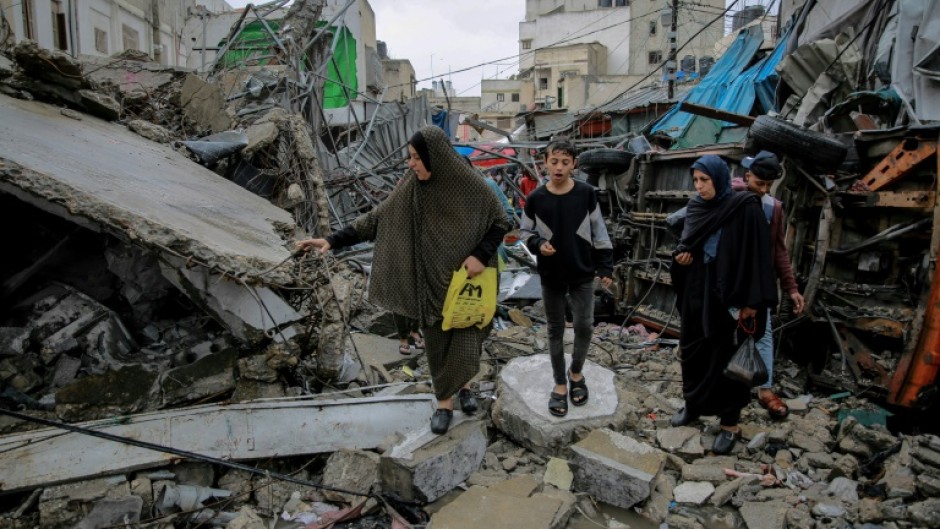JERUSALEM - A truce between Israel and Hamas will be extended by two days, mediator Qatar said hours before the pause was due to end Tuesday, as more hostages were freed from Gaza in exchange for the release of dozens of Palestinian prisoners.
"The Palestinian and Israeli sides have reached an agreement to extend the humanitarian pause in Gaza for two additional days under the same conditions," Qatar's foreign ministry said in a statement on X, formerly Twitter.
Militant group Hamas also confirmed the extension, though there was no official word from Israel.
The extension came as 11 more hostages were freed from Gaza, along with the release of another 33 Palestinian prisoners -- the last exchange under the existing deal.
The extension of the truce was welcomed internationally, with UN Secretary General Antonio Guterres calling it "a glimpse of hope and humanity in the middle of the darkness of war".
The truce has paused fighting that began when Hamas militants poured over the border into Israel, killing 1,200 people, mostly civilians, and kidnapping dozens, according to Israeli officials.
Israel's retaliatory ground and air operation in Gaza has killed almost 15,000 people, mostly civilians, according to the territory's Hamas government.
Late Monday, 11 hostages arrived in Israel, the country's military said.
"Our forces will accompany them until they are reunited with their families," it said in a statement, adding that the military "salutes and embraces the released hostages upon their return home".
Most of the group are dual nationals, with Argentinians, Germans and French among those released, and all 11 were from the Nir Oz kibbutz, the community said.

The releases brought "a sigh of relief to our community, however we remain deeply concerned about our loved ones that are still held hostage," kibbutz official Osnat Peri said.
Images released by the Israeli military showed French-Israeli child Eitan Yahalomi reunited with his mother, who gripped him tightly to her.
Shortly after the arrival of the hostages was confirmed, Israel's prison authority said 33 Palestinian inmates had been released.
In east Jerusalem, prisoner Muhammad Abu Al-Humus called his release "an indescribable joy" and kissed his mother's hand as he entered his home, while crowds in the West Bank town of Beitunia waved green Hamas flags to greet those arriving on a coach.
But nearby there were also clashes with Israeli troops by Ofer prison, with Palestinians burning tyres and throwing stones. The Palestinian health ministry said one person was killed.
- 'Unbearable suffering' -

In all, 50 Israeli hostages have been released under the truce deal, in exchange for 150 Palestinian prisoners, with another 19 hostages freed under separate agreements, including Thai workers and a dual Russian-Israeli citizen.
Hamas said it was now drawing up lists of additional hostages to be released, though the process is reportedly complicated by the fact that some are held by other militant groups.
US National Security Council spokesman John Kirby said that "in order to extend the pause, Hamas has committed to releasing another 20 women and children".
Israel views the truce as temporary to secure hostage releases and plans to continue its war, with the government agreeing a 30.3 billion shekel ($8.2 billion) war budget that will now go to parliament.
But it faces increasing pressure for a more lasting ceasefire and the ramp-up of humanitarian aid to Gaza, where an estimated 1.7 million people have been displaced, according to the United Nations.
This week, US Secretary of State Antony Blinken will pay his third wartime visit to the Middle East, meeting Israeli Prime Minister Benjamin Netanyahu in Tel Aviv and Palestinian president Mahmud Abbas in Ramallah.
"The secretary will stress the need to sustain the increased flow of humanitarian assistance to Gaza, secure the release of all hostages and improve protection to civilians in Gaza," a senior US official said.
He will discuss "the principles he laid out for the future of Gaza and the need to establish an independent Palestinian state," the official added.
- 'Catastrophic' -

Inside Gaza, the Hamas-run health ministry said no fuel had arrived for generators at hospitals in the territory's north, despite the truce.
And UN official Tor Wennesland warned the humanitarian situation "remains catastrophic."
It "requires the urgent entry of additional aid and supplies in a smooth, predictable, and continuous manner to alleviate the unbearable suffering of Palestinians in Gaza," the UN special coordinator for the Middle East peace process said.
The truce has allowed residents who fled fighting in northern Gaza to return to Gaza City, which has been ravaged by relentless Israeli bombardment.
People walked or bicycled along debris-lined streets, where the cars were flattened and buildings torn apart.
Gaza City Mayor Yahya al-Siraj said that without fuel, the territory could not pump clean water or clear waste accumulating in the streets, warning of a potential public health "catastrophe".

The fighting has left many with devastating injuries, which doctors in Gaza have struggled to treat because of limited supplies.
Clean-up was under way at Gaza's largest hospital, Al-Shifa, which Israel targeted saying it was used as a command centre by Hamas.
"We hope it can soon resume its activities," said Gaza health ministry spokesman Mahmud Hammad.
A limited number of Palestinians have been airlifted to the United Arab Emirates for treatment after crossing from Gaza to Egypt, including seven-year-old Yussef, who gnawed on his nails next to his mother Nouzha Fawzi.
"He was not like that before," she said of Yussef, who suffers the blood disorder hemophilia.
"Since the war, he no longer speaks much. He is afraid of everything," she added. "He asks me if he will die."
burs-sah/kma
By Adel Zaanoun With Michael Blum In Jerusalem

